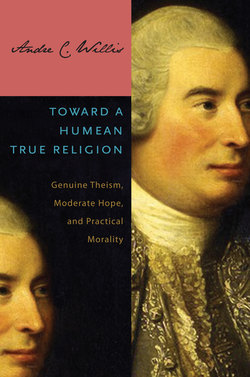Toward a Humean True Religion

Реклама. ООО «ЛитРес», ИНН: 7719571260.
Оглавление
Andre C. Willis. Toward a Humean True Religion
Отрывок из книги
TOWARD A
HUMEAN
.....
The body of my argument is given in the three chapters that follow the first one. Each attends to a feature of the speculative true religion that I am trying to build. Chapter 2 argues that Hume’s early philosophical writings presuppose a natural belief in general providence. Without the presupposition of regularity in nature (“secret springs and principles”) Hume could not have formulated his theory of ideas. I call this Hume’s basic theism and argue that it is foundational to his project and a presupposition of any science. I examine the path Hume carves between Cartesian rationalism and Pyrrhonian skepticism to demonstrate that this basic theism can evolve into either the vulgar theism of false religion or the genuine theism of true religion. I rehearse Hume’s theory of ideas and his discussion of belief to show that his causal worldview allows for the assertion that our imagination naturally projects an Author of Nature (ultimately unknowable) based on our observation of effects (with unobservable causes). This genuine theism is made intelligible in Norman Kemp Smith’s discussion of Hume’s theory of belief, which posits the category of natural belief. Thus, I can justifiably posit natural belief in genuine theism as the first leg in the stool of a Humean true religion.
In chapter 3, I discuss the discourse on the passions that Hume inherited and present his general theory of the passions. He explicitly described the category of hope—the opposite of fear—as a direct passion that occurred when “the mind by an original instinct tends to unite itself with the good, and to avoid the evil” (T, 2.3.9.2). He showed in both the Enquiry (1748) and the Natural History of Religion (1757) that this hope, always linked to fear, was the driving force behind popular religion, superstition, and enthusiasm, along with their concomitants, miracles and salvation. My intervention is to elucidate Hume’s notion of hope in light of Joseph Godfrey’s theory of hope. This exposes that Hume’s own hopes—“where experiments of this kind are judiciously collected and compared, we may hope to establish on them a science” (T, intro., 10)—were very calm and moderate. He never exhibited, in his life, letters, or work, personal hopes of the sort that he described as direct passion hopes. He consciously moderated his passions and was generally known to be of a temperate, peaceful, and congenial disposition even in the face of personal misery. This disposition, which Godfrey contends is a type of hope (fundamental hope), might be a useful component of our Humean true religion. It implies a trust in nature, and this particular kind of trust implies a belief that what we have is all we need.23
.....